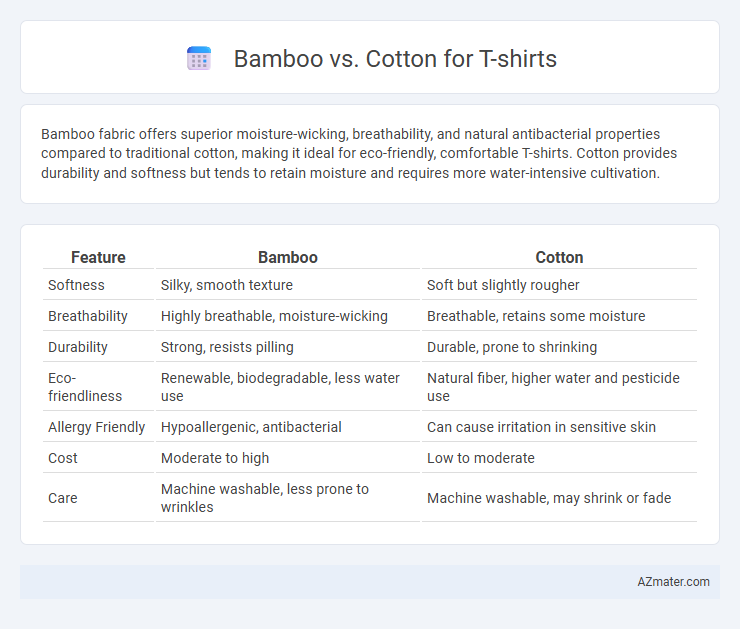Bamboo fabric offers superior moisture-wicking, breathability, and natural antibacterial properties compared to traditional cotton, making it ideal for eco-friendly, comfortable T-shirts. Cotton provides durability and softness but tends to retain moisture and requires more water-intensive cultivation.
Table of Comparison
| Feature | Bamboo | Cotton |
|---|---|---|
| Softness | Silky, smooth texture | Soft but slightly rougher |
| Breathability | Highly breathable, moisture-wicking | Breathable, retains some moisture |
| Durability | Strong, resists pilling | Durable, prone to shrinking |
| Eco-friendliness | Renewable, biodegradable, less water use | Natural fiber, higher water and pesticide use |
| Allergy Friendly | Hypoallergenic, antibacterial | Can cause irritation in sensitive skin |
| Cost | Moderate to high | Low to moderate |
| Care | Machine washable, less prone to wrinkles | Machine washable, may shrink or fade |
Introduction: The Bamboo vs Cotton T-Shirt Debate
Bamboo and cotton are two popular materials used in T-shirt manufacturing, each offering distinct benefits in comfort, sustainability, and durability. Bamboo fabric is praised for its natural antibacterial properties, moisture-wicking abilities, and eco-friendliness due to faster growth rates and lower water consumption compared to cotton. Conversely, cotton remains favored for its softness, breathability, and widespread availability, making the bamboo versus cotton T-shirt debate centered on balancing environmental impact with fabric performance.
Environmental Impact: Bamboo vs Cotton
Bamboo requires significantly less water than cotton, using up to 75% less irrigation, making it a more sustainable choice for T-shirt production. The rapid growth rate of bamboo allows for quicker harvest cycles, reducing land use and soil depletion compared to cotton farming. Cotton cultivation often involves heavy pesticide use, contributing to soil degradation and water pollution, whereas bamboo generally grows without pesticides, minimizing environmental harm.
Comfort and Breathability Compared
Bamboo fabric offers superior softness and moisture-wicking properties compared to cotton, making bamboo T-shirts exceptionally comfortable for all-day wear. The natural breathability of bamboo fibers allows better air circulation, reducing sweat accumulation and keeping the skin cool. Cotton, while breathable, tends to retain more moisture, which can lead to a heavier, less comfortable feel during intense physical activities or hot climates.
Durability and Longevity of Fabrics
Bamboo fabric offers exceptional durability due to its natural strength and resistance to wear, making bamboo T-shirts long-lasting and able to maintain their shape after multiple washes. Cotton T-shirts, while soft and breathable, tend to wear out faster, showing signs of pilling and fading over time, especially with frequent use. Bamboo's antimicrobial properties and moisture-wicking capabilities also contribute to the fabric's longevity by reducing odor and bacterial buildup, extending the life of the garment.
Moisture-Wicking and Odor Control
Bamboo fabric excels in moisture-wicking by efficiently pulling sweat away from the skin, keeping the wearer dry and comfortable during intense activities. Its natural antibacterial properties inhibit odor-causing bacteria, ensuring fresher wear even after prolonged use. Cotton, while breathable, absorbs moisture and retains sweat, which can lead to a damp feeling and increased odor over time.
Hypoallergenic Properties Explained
Bamboo fabric exhibits superior hypoallergenic properties compared to cotton, making it ideal for sensitive skin and allergy sufferers. Its natural antimicrobial and moisture-wicking qualities reduce the risk of skin irritation and bacterial growth, unlike conventional cotton that can retain allergens and cause discomfort. Bamboo fibers' smooth texture further minimizes friction, enhancing comfort for individuals prone to skin reactions.
Production Cost and Affordability
Bamboo t-shirts generally have higher production costs due to the specialized processing required to convert bamboo fibers into soft fabric, resulting in slightly higher retail prices compared to cotton. Cotton t-shirts benefit from well-established, large-scale farming and manufacturing infrastructure, making them more affordable and widely accessible. Consumers seeking budget-friendly options typically find cotton t-shirts more cost-effective, while bamboo offers eco-friendly benefits that may justify its premium price.
Style and Fabric Appearance
Bamboo fabric offers a smooth, silky texture with a natural sheen that enhances the style of T-shirts, making them appear more luxurious and sophisticated compared to cotton. Cotton T-shirts provide a matte finish with a classic, casual look, known for their breathability and softness but lacking the subtle luster of bamboo. The drape of bamboo fabric tends to be more fluid and lightweight, giving T-shirts a sleek silhouette, whereas cotton maintains a sturdier, more structured appearance.
Care and Maintenance Requirements
Bamboo T-shirts require gentle washing in cold water and air drying to preserve their softness and durability, while cotton T-shirts are more resilient to higher temperatures but may shrink if not pre-shrunk. Bamboo fabric naturally resists odors and wrinkles, reducing the need for frequent washing and ironing compared to cotton. Both materials should avoid bleach to maintain fiber integrity and color vibrancy for long-lasting wear.
Which T-Shirt Material is Better for You?
Bamboo T-shirts offer superior breathability, moisture-wicking properties, and natural antibacterial benefits, making them ideal for sensitive skin and active lifestyles. Cotton T-shirts provide durability, softness, and ease of care, making them a classic choice for everyday comfort and versatility. Choosing between bamboo and cotton depends on your priorities for sustainability, comfort, and performance in a T-shirt material.

Infographic: Bamboo vs Cotton for T-shirt
 azmater.com
azmater.com